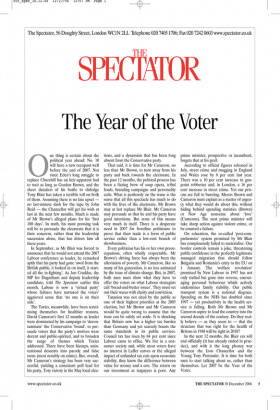The Year of the Voter
One thing is certain about the political year ahead: No. 10 will have a new occupant well before the end of 2007. Not since Eden’s long struggle to replace Churchill has an heir-apparent had to wait as long as Gordon Brown, and the sheer duration of his battle to dislodge Tony Blair has taken a terrible toll on both of them. Assuming there is no late upset no last-minute dash for the tape by John Reid — the Chancellor will get his wish at last in the next few months. Much is made of Mr Brown’s alleged plans for his ‘first 100 days’. In truth, his most pressing task will be to persuade the electorate that it is their concerns, rather than the leadership succession alone, that has driven him all these years.
In September, as Mr Blair was forced to announce that he would not attend the 2007 Labour conference as leader, he remarked aptly that his party had gone ‘awol from the British public, it looked in on itself, it started all the in-fighting’. As Jon Cruddas, the MP for Dagenham and deputy leadership candidate, told The Spectator earlier this month, Labour is now a ‘virtual party’ whose failures have nurtured the voters’ aggrieved sense that ‘no one is on their side’.
The Tories, meanwhile, have been scrutinising themselves for healthier reasons. David Cameron’s first 12 months as leader were dominated by his campaign to ‘decontaminate’ the Conservative ‘brand’, to persuade voters that the party’s motives were decent and public-spirited, and to broaden the range of themes which Tories addressed. There have been hiccups, unintentional descents into parody and false turns (most notably on crime). But, overall, Mr Cameron’s strategy has been very successful, yielding a consistent poll lead for his party, Tory victory in the May local elec tions, and a dynamism that has been long absent from the Conservative party.
That said, it is time for Mr Cameron, no less than Mr Brown, to turn away from his party and back towards the electorate. In the past 12 months, the political process has been a fizzing brew of soap opera, tribal feuds, branding campaigns and personality cults. What is perilously on the wane is the sense that all this spectacle has much to do with the lives of the electorate. Mr Brown may at last replace Mr Blair. Mr Cameron may persuade us that he and his party have good intentions. But none of this means very much in itself. There is a desperate need in 2007 for frontline politicians to prove that their trade is a form of public service rather than a low-rent branch of showbusiness.
Every politician has his or her own preoccupations, often wholly respectable. Mr Brown’s driving force has always been the alleviation of poverty. Mr Cameron, like so many of his generation, is no less animated by the issue of climate change. But, in 2007, both men must show what they have to offer the voters on what Labour strategists call ‘bread-and-butter issues’. They must set out their wares with clarity and conviction.
Taxation was not cited by the public as one of their highest priorities at the 2005 election, but Mr Brown and Mr Cameron would be quite wrong to assume that the issue can be safely set aside. It is shocking that Britain now has a higher tax burden than Germany and yet scarcely boasts the same standards in its public services. Council tax has risen by 84 per cent since Labour came to office. We live in a consumer society and, while most voters have no interest in Laffer curves or the alleged impact of unfunded tax cuts upon economic stability, they know the difference between value for money and a con. The return on our investment as taxpayers is poor. Any prime minister, prospective or incumbent, forgets that at his peril.
According to official figures released in July, street crime and mugging in England and Wales rose by 8 per cent last year. There was a 10 per cent increase in gunpoint robberies and, in London, a 16 per cent increase in street crime. Yet our prisons are full to bursting. Messrs Brown and Cameron must explain as a matter of urgency what they would do about this, without hiding behind spending statistics (Brown) or New Age nonsense about ‘love’ (Cameron). The next prime minister will take sharp action against violent crime, or be counted a failure.
On education, the so-called ‘post-comprehensive’ system promised by Mr Blair has conspicuously failed to materialise. Our border controls remain a joke, threatening public confidence in the perfectly legitimate managed migration that should follow Bulgaria and Romania’s entry to the EU on 1 January. The ‘welfare revolution’ promised by New Labour in 1997 has not only stalled but gone into reverse, encouraging personal behaviour which actively undermines family stability. Our public transport system is a national disgrace. Spending on the NHS has doubled since 1997 — yet productivity in the health service is falling. Both Mr Brown and Mr Cameron aspire to lead the country into the second decade of the century. Do they really believe — as they seem to — that the structure that was right for the health of Britons in 1948 will be right in 2018?
In the next 12 months, the Blair era will end officially (it has already ended in practice), and with it the long phoney war between the Iron Chancellor and the Young Tory Pretender. It is time for both men to start talking about us, rather than themselves. Let 2007 be the Year of the Voter.




































 Previous page
Previous page